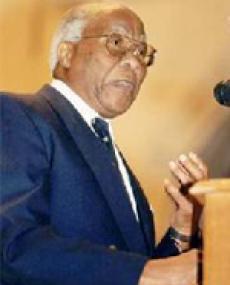
Govan Mbeki (Oom Gov) joined the South African Communist Party (SACP) in the 1950's and remained a communist and a firm believer in the superior morality of socialism to his last day. He threw himself into the work of linking the struggle for socialism in our country with the struggle for the national liberation of black people by cementing strong relations between the SACP, the African National Congress and the trade union movement.
He was one of the leading pioneers in the founding of the people's army UmKhonto we Sizwe. Together with Nelson Mandela, Walter Sisulu, Ahmed Kathrada, Elias Motsoaledi, Raymond Mhlaba, Andrew Mlangeni, Wilton Mkwayi and Dennis Goldberg he was sentenced to life imprisonment in the Rivonia Trial by the apartheid regime in 1964.
Upon his release in 1987, he was immediately part of the people's struggles to defeat the apartheid regime by contributing to the rebuilding of legal structures of the ANC and the SACP.
In all his work, he distinguished himself as a scholar, a disciplined cadre, a builder and a teacher. Few political activists in our movement have paid such attention to the indigenous application of the science and theory of Marxism to South African realities and conditions. He built and sustained a tradition of excellent political journalism and theoretical writing. His book, The Peasants Revolt was a major historical study of peasant struggles in Pondoland and Sekhukhuneland. He came out of Robben Island having published several books and having written many articles used for lectures internationally. Indeed, he was one of the great Marxist writers of the previous century.